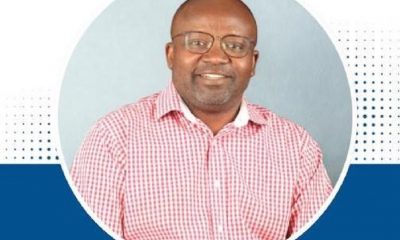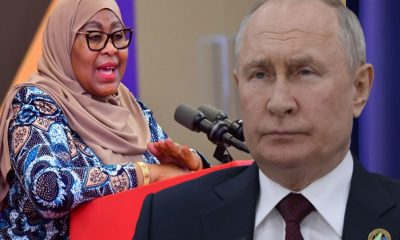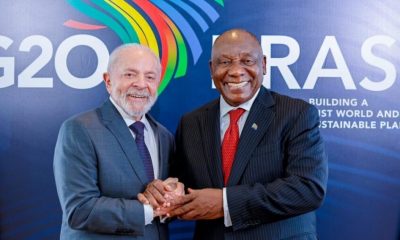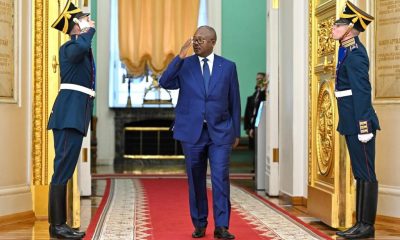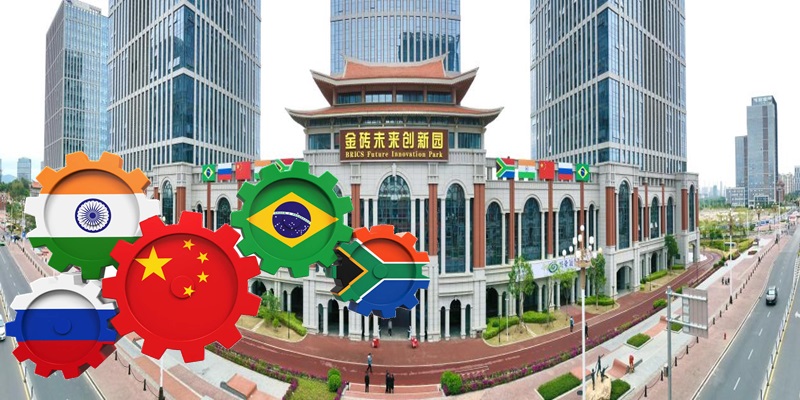World
BRICS Role in Development of Polycentric World
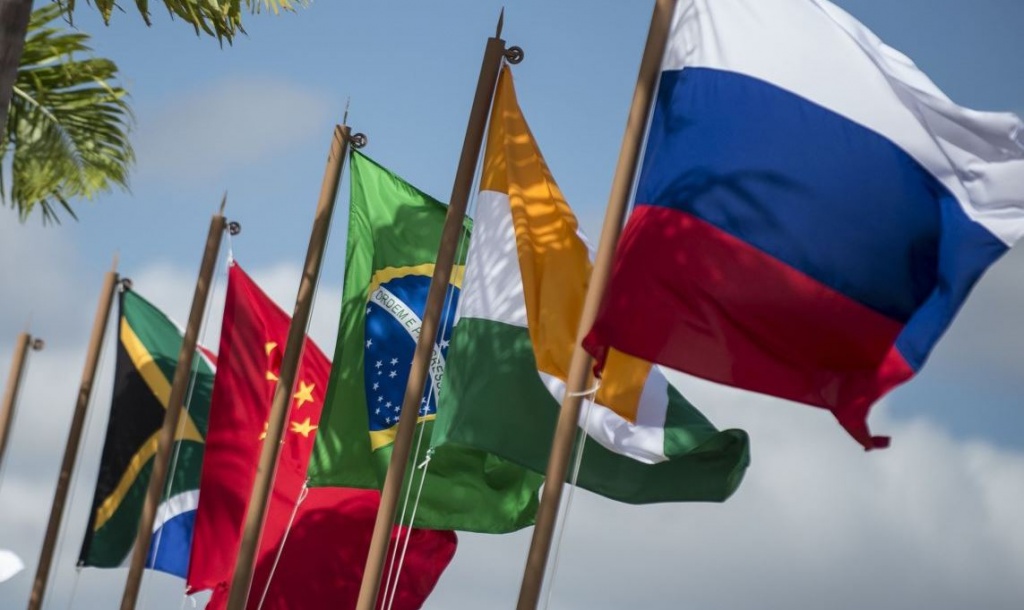
By Professor Maurice Okoli
At the Konstantinovsky Palace in St. Petersburg, Russian President Vladimir Putin held his first meeting with Dilma Rousseff, President of the New Development Bank (NDB), established by the BRICS (Brazil, Russia, India, China, and South Africa) in 2015. Rousseff, the first woman to lead the bank, was appointed to head it earlier this year by Brazilian President Luiz Inacio Lula da Silva.
It is a multilateral development bank established with an initial capital of $100 billion. According to the NDB’s stipulated primary functions, it has to cooperate with international organizations and other financial entities and provide technical assistance for projects to be supported by the Bank.
Taking this into account, the main objectives of the NDB can be summarized as follows: promote infrastructure and sustainable development projects with a significant development impact in member countries; establish an extensive network of global partnerships with other multilateral development institutions and national development banks; build a balanced project portfolio giving proper respect to their geographic location, financing requirements and other factors.
The idea for setting up the bank was proposed by India at the 4th BRICS summit in 2012 held in Delhi but was finally created three years later. On 21 December 2016, the NDB signed its first loan agreement. The bank issued loans of up to $40 billion by 2022 in South Africa. Since its creation, it has supported various projects in member countries.
In early March 2022, in response to the Russia-Ukraine conflict, the New Development Bank announced that it had put new transactions with Russia on hold. Russia launched its special military operation on neighbouring Ukraine. The NDB, the multilateral bank set up by the BRICS states, is not considering new projects in Russia as it operates in line with restrictions imposed in financial and capital markets.
Late July bilateral meeting between Putin and the former Brazilian President Rousseff was to discuss BRICS financial questions and emerging geopolitical developments. Russia and Brazil are staunch members; notably, in 2014, Putin and Rousseff stood firmly at the origins of the creation of this financial structure.
In today’s changing conditions, BRICS has been very concerned about de-dollarization and strongly advocating for its currency. Thus, in the discussions on July 26 in St. Petersburg, Putin stressed doubtlessly that Rousseff used her rich experience in public work and knowledge in this area to develop the institution, which is very important in today’s time.
In today’s conditions, this is not easy to do, given what is happening in world finance and the use of the dollar as an instrument of political struggle. But the members of BRICS are not “friends” against someone; they work in each other’s interests. This also applies to the financial sector.
“In general, we are good participants in this organization; we fulfil everything on time, all our obligations to it. We know that there is a question about the liquidity of the bank; there are some ideas that come from you, from your staff, and we will support this,” Putin said at the meeting. “Relations between our countries in the BRICS are developing in national currencies, and settlements are increasing. In this regard, the bank can also play a significant role in the development of joint activities.”
It was not the first time that Dilma Rousseff visited St. Petersburg. She vividly recalled that in 2013 she was part of the G20 summit held in Konstantinovsky Palace. She stressed in comments: “I am very glad to see you again, and we really stood at the origins of the creation of the New Development Bank at the Fortaleza summit in 2014.”
The world is really now going through a period of a number of challenges; there are crisis trends and inflation in the countries of the developed world; in the developing world, countries are facing the problem of debt. And, of course, first of all, the countries of the developing world are now in difficult conditions, according to Rousseff.
Undoubtedly, the Russia-Africa summit is very important for those who are interested in the development of the Global South. Russia is a very important partner within the framework of the BRICS, within the framework of the New Development Bank, and indeed fulfils all of its obligations to them. Indeed, the bank faces a number of problems, and above all, it concerns liquidity.
The Bank should play an important role in the development of a multipolar, polycentric world. We must be determined to raise funds in the markets of partner countries. I also believe that there are no obstacles for the countries of the developing world to carry out their foreign trade operations in national currencies among themselves.
“Our development strategy for the period from 2022 to 2026 assumes that about 30 per cent of the funds should be raised in domestic markets. It is also very important to raise funds in different currencies, not only in dollars or euros,” Rousseff noted, and added, “We are very aware of the difficulties that developing countries face in raising funds. They need resources to finance infrastructure projects, to build digital logistics, social logistics and, of course, also to solve environmental problems.”
Rousseff welcomed the initiative to host the Russia-Africa summit because most of these African countries are often left without the necessary resources. Everyone focuses on the issue of their debt, ignoring the need for resources that are observed there. And it seems unacceptable to impose any conditions and requirements in exchange for funding, as is done now by international multilateral organizations. Most of these questions are on the agenda during the next 15th BRICS summit scheduled for August 22nd – 24th, 2023, at the Sandton Convention Centre in Johannesburg, South Africa.
The issues of expanding the institute by admitting countries of the developing world into it are also a priority. Rousseff added she would also meet South African President Cyril Ramaphosa in Russia, where she expects to discuss the expansion of the bank, which in recent years admitted the United Arab Emirates, Bangladesh and Egypt as members.
Russian Prime Minister Mikhail Mishustin, during a meeting in May 2023, with Rousseff, said that the goal of the BRICS bank was to protect the trade and economic relations of the union from the impact of sanctions from unfriendly countries. From the bank’s activities, Russia expects the strengthening of investment cooperation in the BRICS format, the promotion of promising projects in various fields, and the emergence of new points of growth for the national economies of the five states.
In May 2022, the New Development Bank set up a regional office in India in the state of Gujarat to finance and observe infrastructure projects in both India and Bangladesh. In May 2023, Saudi Arabia expressed its intention to join the NDB. Currently, more than 40 countries have expressed a desire to join the BRICS group. That BRICS has the potential to become a global player is a fact since more countries intend to join the group, and if we look carefully, each of them has significant assets to contribute: some have huge financial potential, others have huge demographic potential, others have expertise in particular industries.
More countries have become interested in joining the group: Afghanistan, Algeria, Argentina, Bahrain, Bangladesh, Belarus, Egypt, Indonesia, Iran, Kazakhstan, Mexico, Nicaragua, Nigeria, Pakistan, Saudi Arabia, Senegal, Sudan, Syria, United Arab Emirates, Thailand, Tunisia, Turkye, Uruguay, Venezuela, Zimbabwe. This growing interest in the BRICS project has various underlying motivations, which have to be accommodated within the broader framework.
Historically, the first meeting of the group began in St Petersburg in 2005. It was called RIC, which stood for Russia, India and China. Then, Brazil and, subsequently, South Africa joined later, which is why it is now referred to as BRICS. The BRICS member countries (Brazil, Russia, India, China and South Africa) collectively represent about 26% of the world’s geographic area and are home to 2.88 billion people, about 42% of the world’s population.
By Professor Maurice Okoli is a fellow at the Institute for African Studies and the Institute of World Economy and International Relations, Russian Academy of Sciences. He is also a fellow at the North-Eastern Federal University of Russia.
World
African Visual Art is Distinguished by Colour Expression, Dynamic Form—Kalalb

By Kestér Kenn Klomegâh
In this insightful interview, Natali Kalalb, founder of NAtali KAlalb Art Gallery, discusses her practical experiences of handling Africa’s contemporary arts, her professional journey into the creative industry and entrepreneurship, and also strategies of building cultural partnership as a foundation for Russian-African bilateral relations. Here are the interview excerpts:
Given your experience working with Africa, particularly in promoting contemporary art, how would you assess its impact on Russian-African relations?
Interestingly, my professional journey in Africa began with the work “Afroprima.” It depicted a dark-skinned ballerina, combining African dance and the Russian academic ballet tradition. This painting became a symbol of cultural synthesis—not opposition, but dialogue.
Contemporary African art is rapidly strengthening its place in the world. By 2017, the market was growing so rapidly that Sotheby launched its first separate African auction, bringing together 100 lots from 60 artists from 14 foreign countries, including Algeria, Ghana, Mali, Nigeria, Senegal, and others. That same year during the Autumn season, Louis Vuitton Foundation in Paris hosted a major exhibition dedicated to African art. According to Artnet, sales of contemporary African artists reached $40 million by 2021, a 434% increase in just two years. Today, Sotheby holds African auctions twice a year, and in October 2023, they raised $2.8 million.
In Russia, this process manifests itself through cultural dialogue: exhibitions, studios, and educational initiatives create a space of trust and mutual respect, shaping the understanding of contemporary African art at the local level.
Do you think geopolitical changes are affecting your professional work? What prompted you to create an African art studio?
The international context certainly influences cultural processes. However, my decision to work with African themes was not situational. I was drawn to the expressiveness of African visual language—colour, rhythm, and plastic energy. This theme is practically not represented systematically and professionally in the Russian art scene.
The creation of the studio was a step toward establishing a sustainable platform for cultural exchange and artistic dialogue, where the works of African artists are perceived as a full-fledged part of the global cultural process, rather than an exotic one.
To what extent does African art influence Russian perceptions?
Contemporary African art is gradually changing the perception of the continent. While previously viewed superficially or stereotypically, today viewers are confronted with the depth of artistic expression and the intellectual and aesthetic level of contemporary artists.
Portraits are particularly impactful: they allow us to see not just an abstract image of a “continent,” but a concrete personality, character, and inner dignity. Global market growth data and regular auctions create additional trust in African contemporary art and contribute to its perception as a mature and valuable movement.
Does African art reflect lifestyle and fashion? How does it differ from Russian art?
African art, in my opinion, is at its peak in everyday culture—textiles, ornamentation, bodily movement, rhythm. It interacts organically with fashion, music, interior design, and the urban environment. The Russian artistic tradition is historically more academic and philosophical. African visual art is distinguished by greater colour expression and dynamic form. Nevertheless, both cultures are united by a profound symbolic and spiritual component.
What feedback do you receive on social media?
Audience reactions are generally constructive and engaging. Viewers ask questions about cultural codes, symbolism, and the choice of subjects. The digital environment allows for a diversity of opinions, but a conscious interest and a willingness to engage in cultural dialogue are emerging.
What are the key challenges and achievements of recent years?
Key challenges:
- Limited expert base on African contemporary art in Russia;
- Need for systematic educational outreach;
- Overcoming the perception of African art as exclusively decorative or ethnic.
Key achievements:
- Building a sustainable audience;
- Implementing exhibition and studio projects;
- Strengthening professional cultural interaction and trust in African
contemporary art as a serious artistic movement.
What are your future prospects in the context of cultural diplomacy?
Looking forward, I see the development of joint exhibitions, educational programs, and creative residencies. Cultural diplomacy is a long-term process based on respect and professionalism. If an artistic image is capable of uniting different cultural traditions in a single visual space, it becomes a tool for mutual understanding.
World
Ukraine Reveals Identities of Nigerians Killed Fighting for Russia

By Adedapo Adesanya
The Ukrainian Defence Intelligence (UDI) has identified two Nigerian men, Mr Hamzat Kazeem Kolawole and Mr Mbah Stephen Udoka, allegedly killed while fighting as Russian mercenaries in the war between the two countries ongoing since February 2022.
The development comes after Russia denied knowledge of Nigerians being recruited to fight on the frontlines.
Earlier this week, the Russian Ambassador to Nigeria, Mr Andrey Podyolyshev, said in Abuja that he was not aware of any government-backed programme to recruit Nigerians to fight in the war in Ukraine.
He said if at all such activity existed, it is not connected with the Russian state.
However, in a statement on Thursday, the Ukrainian Defence released photographs of Nigerians killed while defending Russia.
“In the Luhansk region, military intelligence operatives discovered the bodies of two citizens of the Federal Republic of Nigeria — Hamzat Kazeen Kolawole (03.04.1983) and Mbah Stephen Udoka (07.01.1988),” the statement read.
According to the statement, both men served in the 423rd Guards Motor Rifle Regiment (military unit 91701) of the 4th Guards Kantemirovskaya Tank Division of the armed forces of the Russian Federation.
UDI said that they signed contracts with the Russian Army in the second half of 2025 – the deceased Mr Kolawole on August 29 and Mr Udoka on September 28.
“Udoka received no training whatsoever — just five days later, on October 3, he was assigned to the unit and sent to the temporarily occupied territories of Ukraine,” the report read.
It added that no training records for Mr Kolawole have been preserved; however, it is highly likely that he also received no military training, but his wife and three children remain in Nigeria.
Both Nigerians, the report added, were killed in late November during an attempt to storm Ukrainian positions in the Luhansk region.
“They never engaged in a firefight — the mercenaries were eliminated by a drone strike,” UDI stated, warning foreign citizens against travelling to the Russian Federation or taking up any work on the territory of the “aggressor state”.
“A trip to Russia is a real risk of being forced into a suicide assault unit and, ultimately, rotting in Ukrainian soil,” the statement read.
In an investigation earlier this month, CNN reported that hundreds of African men have been enticed to fight for Russia in Ukraine with the promise of civilian jobs and high salaries. However, the media organisation uncovered that they are being deceived or sent to the front lines with little combat training.
CNN said it reviewed hundreds of chats on messaging apps, military contracts, visas, flights and hotel bookings, as well as gathering first-hand accounts from African fighters in Ukraine, to understand just how Russia entices African men to bolster its ranks.
World
Today’s Generation of Entrepreneurs Value Flexibility, Autonomy—McNeal-Weary

By Kestér Kenn Klomegâh
The Young African Leaders Initiative (YALI) is the United States’ signature step to invest in the next generation of African leaders. Since its establishment in 2010 by Obama administration, YALI has offered diverse opportunities, including academic training in leadership, governance skills, organizational development and entrepreneurship, and has connected with thousands of young leaders across Africa. This United States’ policy collaboration benefits both America and Africa by creating stronger partnerships, enhancing mutual prosperity, and ensuring a more stable environment.
In our conversation, Tonya McNeal-Weary, Managing Director at IBS Global Consulting, Inc., Global Headquarters in Detroit, Michigan, has endeavored to discuss, thoroughly, today’s generation of entrepreneurs and also building partnerships as a foundation for driving positive change and innovation in the global marketplace. Here are the excerpts of her conversation:
How would you describe today’s generation of entrepreneurs?
I would describe today’s generation of entrepreneurs as having a digital-first mindset and a fundamental belief that business success and social impact can coexist. Unlike the entrepreneurs before them, they’ve grown up with the internet as a given, enabling them to build global businesses from their laptops and think beyond geographic constraints from day one. They value flexibility and autonomy, often rejecting traditional corporate ladders in favor of building something meaningful on their own terms, even if it means embracing uncertainty and financial risk that previous generations might have avoided.
And those representing the Young African Leaders Initiative, who attended your webinar presentation late January 2026?
The entrepreneurs representing the Young African Leaders Initiative are redefining entrepreneurship on the continent by leveraging their unique perspectives, cultural heritage, and experiences. Their ability to innovate within local contexts while connecting to global opportunities exemplifies how the new wave of entrepreneurs is not confined by geography or conventional expectations.
What were the main issues that formed your ‘lecture’ with them, Young African Leaders Initiative?
The main issues that formed my lecture for the Young African Leaders Initiative were driven by understanding the importance of building successful partnerships when expanding into the United States or any foreign market. During my lecture, I emphasized that forming strategic alliances can help entrepreneurs navigate unfamiliar business environments, access new resources, and foster long-term growth. By understanding how to establish strong and effective partnerships, emerging leaders can position their businesses for sustainable success in global markets. I also discussed the critical factors that contribute to successful partnerships, such as establishing clear communication channels, aligning on shared goals, and cultivating trust between all parties involved. Entrepreneurs must be proactive in seeking out partners who complement their strengths and fill gaps in expertise or resources. It is equally important to conduct thorough due diligence to ensure that potential collaborators share similar values and ethical standards. Ultimately, the seminar aimed to empower YALI entrepreneurs with practical insights and actionable strategies for forging meaningful connections across borders. Building successful partnerships is not only a pathway to business growth but also a foundation for driving positive change and innovation in the global marketplace.
What makes a ‘leader’ today, particularly, in the context of the emerging global business architecture?
In my opinion, a leader in today’s emerging global business architecture must navigate complexity and ambiguity with a fundamentally different skill set than what was previously required. Where traditional leadership emphasized command-and-control and singular vision, contemporary leaders succeed through adaptive thinking and collaborative influence across decentralized networks. Furthermore, emotional intelligence has evolved from a soft skill to a strategic imperative. Today, the effective modern leader must possess deep cross-cultural intelligence, understanding that global business is no longer about exporting one model worldwide but about genuinely integrating diverse perspectives and adapting to local contexts while maintaining coherent values.
Does multinational culture play in its (leadership) formation?
I believe multinational culture plays a profound and arguably essential role in forming the kind of leadership required in today’s global business environment. Leaders who have lived, worked, or deeply engaged across multiple cultural contexts develop a cognitive flexibility that’s difficult to replicate through reading or training alone. More importantly, multinational exposure tends to dismantle the unconscious certainty that one’s own way of doing things is inherently “normal” or “best.” Leaders shaped in multicultural environments often develop a productive discomfort with absolutes; they become more adept at asking questions, seeking input, and recognizing blind spots. This humility and curiosity become strategic assets when building global teams, entering new markets, or navigating geopolitical complexity. However, it’s worth noting that multinational experience alone doesn’t automatically create great leaders. What matters is the depth and quality of cross-cultural engagement, not just the passport stamps. The formation of global leadership is less about where someone has been and more about whether they’ve developed the capacity to see beyond their own cultural lens and genuinely value differences as a source of insight rather than merely tolerating them as an obstacle to overcome.
In the context of heightening geopolitical situation, and with Africa, what would you say, in terms of, people-to-people interaction?
People-to-people interaction is critically important in the African business context, particularly as geopolitical competition intensifies on the continent. In this crowded and often transactional landscape, the depth and authenticity of human relationships can determine whether a business venture succeeds or fails. I spoke on this during my presentation. When business leaders take the time for face-to-face meetings, invest in understanding local priorities rather than imposing external agendas, and build relationships beyond the immediate transaction, they signal a different kind of partnership. The heightened geopolitical situation actually makes this human dimension more vital, not less. As competition increases and narratives clash about whose model of development is best, the businesses and nations that succeed in Africa will likely be those that invest in relationships characterized by reciprocity, respect, and long-term commitment rather than those pursuing quick wins.
How important is it for creating public perception and approach to today’s business?
Interaction between individuals is crucial for shaping public perception, as it influences views in ways that formal communications cannot. We live in a society where word-of-mouth, community networks, and social trust areincredibly important. As a result, a business leader’s behavior in personal interactions, their respect for local customs, their willingness to listen, and their follow-through on commitments have a far-reaching impact that extends well beyond the immediate meeting. The geopolitical dimension amplifies this importance because African nations now have choices. They’re no longer dependent on any single partner and can compare approaches to business.
From the above discussions, how would you describe global business in relation to Africa? Is it directed at creating diverse import dependency?
While it would be too simplistic to say global business is uniformly directed at creating import dependency, the structural patterns that have emerged often produce exactly that outcome, whether by design or as a consequence of how global capital seeks returns. Global financial institutions and trade agreements have historically encouraged African nations to focus on their “comparative advantages” in primary commodities rather than industrial development. The critical question is whether global business can engage with Africa in ways that build productive capacity, transfer technology, develop local talent, and enable countries to manufacture for themselves and for export—or whether the economic incentives and power irregularities make this structurally unlikely without deliberate policy intervention.
-

 Feature/OPED6 years ago
Feature/OPED6 years agoDavos was Different this year
-
Travel/Tourism10 years ago
Lagos Seals Western Lodge Hotel In Ikorodu
-

 Showbiz3 years ago
Showbiz3 years agoEstranged Lover Releases Videos of Empress Njamah Bathing
-

 Banking8 years ago
Banking8 years agoSort Codes of GTBank Branches in Nigeria
-

 Economy3 years ago
Economy3 years agoSubsidy Removal: CNG at N130 Per Litre Cheaper Than Petrol—IPMAN
-

 Banking3 years ago
Banking3 years agoSort Codes of UBA Branches in Nigeria
-

 Banking3 years ago
Banking3 years agoFirst Bank Announces Planned Downtime
-

 Sports3 years ago
Sports3 years agoHighest Paid Nigerian Footballer – How Much Do Nigerian Footballers Earn


